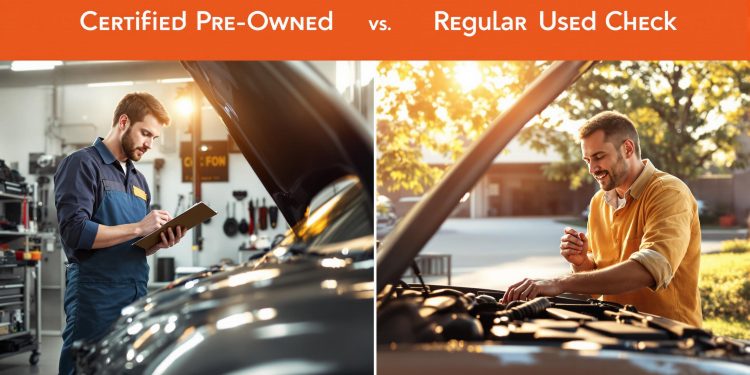When buying a used car, inspections are critical to avoid costly surprises. Certified Pre-Owned (CPO) vehicles offer thorough manufacturer-backed inspections, warranties, and reconditioning, while regular used car checks are less detailed and vary in quality. Here’s why CPO inspections stand out:
- CPO Inspections: Cover 100+ checkpoints, include extended warranties, and ensure vehicles meet strict age and mileage limits.
- Regular Used Car Checks: Focus on basic safety and mechanical checks, with no guaranteed standards or warranties.
Quick Comparison Table
| Feature | CPO Inspections | Regular Used Car Checks |
|---|---|---|
| Inspection Points | 100+ checkpoints | Basic visual and mechanical checks |
| Inspector | Manufacturer-trained technicians | Varies (private mechanics, sellers) |
| Warranty | Extended manufacturer warranty included | Limited or none |
| Reconditioning | Mandatory, using original parts | Optional, depends on seller |
| Vehicle History | Detailed reports provided | Minimal or none |
CPO vehicles are more expensive upfront but offer long-term reliability and peace of mind. Regular used cars are cheaper but riskier, requiring extra diligence. Decide based on your budget and priorities.
Behind the Scenes: CPO vs Regular Used Car Inspections
What is a CPO Vehicle?
A Certified Pre-Owned (CPO) vehicle is a used car that has passed a detailed manufacturer-backed inspection and certification process. These vehicles must meet specific age and mileage criteria, making them a step above standard used cars.
Features of CPO Vehicles
CPO vehicles come with several benefits, including extended manufacturer warranties, comprehensive inspections, detailed vehicle history reports, and roadside assistance. These features result from the meticulous inspection and reconditioning processes that differentiate CPO vehicles from regular used cars.
To qualify for certification, vehicles must meet strict requirements. For instance, Chevrolet and Ford mandate that CPO vehicles be no older than six years and have less than 80,000 miles on the odometer [3].
CPO Programs in South Africa
South Africa’s automotive market includes various CPO programs from top manufacturers like Toyota, Ford, and Chevrolet. These programs are designed with local needs in mind, offering thorough inspections, extended warranties, and strict age and mileage limits.
"CPO vehicles offer buyers a higher level of reliability compared to regular used cars, thanks to the thorough inspection and reconditioning process. Additionally, CPO vehicles often come with extended warranties, which can save buyers money on potential repairs and maintenance" [1][3].
The certification process ensures that each CPO vehicle meets the manufacturer’s standards before being sold. This rigorous process gives buyers added confidence in their purchase, knowing the vehicle has been carefully inspected and approved.
CPO Inspection Process
The CPO inspection process is a manufacturer-approved system designed to ensure vehicles meet strict quality standards before earning certification.
Inspection Checkpoints
CPO inspections typically cover between 100 and 200 checkpoints [1], focusing on two main areas:
Core Systems
- Engine, transmission, and suspension functionality
- Braking systems and steering components
- Safety features like airbags and electronic controls
Structure and Comfort
- Frame integrity and overall body condition
- Climate control and entertainment systems
- Power accessories and other convenience features
Toyota’s inspection process stands out by including specialized evaluations for battery health and hybrid-specific components, such as electric motors and anti-theft systems [3].
CPO checks are far more thorough than standard inspections, leaving no part of the vehicle unchecked. Once a car successfully passes these detailed evaluations, it moves into the reconditioning phase.
Reconditioning and Certification
During reconditioning, vehicles are brought up to certification standards using original-equipment parts [1]. This phase includes mechanical fixes (like fluid replacements and wheel alignment), safety updates (such as brake servicing and new tires), and cosmetic work (paint touch-ups and interior detailing).
Vehicle History and Documentation
"CPO programs verify vehicle history and documentation by consulting vehicle history reports, such as Carfax or AutoCheck, to check for any accidents, flood damage, or other issues. They also verify mileage and ensure that the vehicle has a clean title" [1].
Certified vehicles come with a complete package of supporting documents, including:
- A detailed inspection checklist
- Vehicle history reports
- Maintenance records
- Certification paperwork
This thorough process gives buyers confidence in the quality and dependability of certified pre-owned vehicles, clearly distinguishing them from regular used cars.
Standard Used Car Inspections
Standard used car inspections don’t match the thoroughness of manufacturer-backed CPO checks. They’re often less detailed and can vary widely in quality.
Typical Inspection Practices
Unlike CPO evaluations, standard inspections focus on basic checks. These usually include a visual review, a test drive, and an overall condition assessment. Such inspections are carried out by private sellers, independent mechanics, or dealership staff [2].
For example, in South Africa, vehicles must pass a mandatory roadworthiness test before they can be sold [4]. These tests are done by certified technicians who ensure the car meets basic safety and functionality standards. However, these checks are limited to the essentials and might not uncover deeper issues.
Inspection Limitations and Risks
Standard inspections come with several drawbacks. They often lack consistency, don’t follow a standardized process, and provide only basic mechanical evaluations. Buyers also get minimal documentation and little to no post-purchase protection, which increases the risk of unexpected repair costs.
To reduce these risks, buyers can explore resources like ImotoNews South Africa and AUTO24.co.za. These platforms offer insights into the used car market and can help connect buyers with trusted inspection services.
For added security, it’s wise to hire a qualified mechanic, ask for detailed inspection reports, and document any concerns before finalizing a purchase. While standard inspections are cheaper than CPO certifications, they require extra diligence to ensure a smart buying decision. Understanding these limitations can help buyers differentiate between standard and CPO inspections and make better choices.
sbb-itb-09752ea
Comparing CPO and Regular Used Car Inspections
Here’s how Certified Pre-Owned (CPO) inspections stack up against standard used car inspections.
CPO vs. Regular Inspections Table
| Aspect | CPO Inspections | Regular Used Car Inspections |
|---|---|---|
| Inspection Points | Over 100-point checklist | Basic mechanical and visual checks |
| Inspector Qualification | Manufacturer-trained technicians | Varies (private mechanics or dealership staff) |
| Vehicle Age/Mileage | Strict limits (e.g., Chevrolet: max 6 years, under 75,000 miles) | No specific restrictions |
| Reconditioning | Required repairs to meet certification standards | Optional, based on seller preference |
| Warranty Coverage | Extended manufacturer warranty included | Limited or no warranty |
| Vehicle History | Detailed vehicle history report required | Basic or no history check |
| Quality Assurance | Standardized across certified dealers | Inconsistent standards |
| Post-Purchase Support | Includes roadside assistance and perks | Minimal or none |
The key distinction lies in the thoroughness and consistency of CPO inspections. Manufacturer-trained technicians ensure everything works as it should – from engine performance to safety features like airbags and seatbelts.
In contrast, regular used car inspections are often more affordable but less comprehensive. Private mechanics usually focus on basic checks, which can overlook hidden issues that may become costly later [2].
Choosing between these options isn’t just about the upfront price [1]. Resources like ImotoNews South Africa and AUTO24.co.za can help South African buyers evaluate whether the benefits of CPO certification outweigh the lower initial cost of standard used cars.
These differences explain why many buyers see CPO vehicles as a safer long-term investment – a topic we’ll delve into further in the next section.
Advantages of CPO Vehicles
CPO Vehicle Benefits
Certified Pre-Owned (CPO) vehicles come with a range of perks, such as warranty coverage, attractive financing options, and lower depreciation costs. Unlike new cars, CPO vehicles have already bypassed the steepest depreciation period while still offering high quality. Many manufacturers even provide financing rates comparable to those for new cars [1] [3].
Here are some common perks of CPO programs:
- Extended warranty coverage
- 24/7 roadside assistance
- Vehicle exchange options
- Complimentary maintenance services
- Competitive financing rates
These advantages, paired with thorough inspections, make CPO vehicles a dependable option for many buyers.
Buyer Confidence with CPO
The detailed certification process gives buyers added peace of mind. Each vehicle is subjected to a multi-point inspection, often covering 100 to 200 individual checks.
"Investing slightly more in a CPO car reduces the risk of hidden issues." – U.S. News
Subaru‘s CPO program is a great example of how manufacturers build trust. It includes rigorous inspections, factory-backed warranties, roadside assistance, and repair support.
For buyers in South Africa, resources like ImotoNews South Africa and AUTO24.co.za are helpful for comparing CPO programs across manufacturers. These platforms make it easier to find options that fit your budget and priorities.
While CPO vehicles come with plenty of benefits, comparing them to non-certified options is essential to making the right choice.
Buying Used Cars: What to Consider
CPO vs. Non-Certified Car Costs
Certified Pre-Owned (CPO) cars come at a higher price because they include detailed inspections and warranty coverage. On the other hand, non-certified vehicles are cheaper upfront but could lead to greater repair and inspection expenses later on. The key is deciding whether the upfront savings outweigh the potential costs of repairs and the lack of coverage down the road [1] [3].
For non-certified cars, getting a thorough inspection is even more crucial to ensure you’re not buying into hidden problems.
Inspections for Non-CPO Cars
If you’re considering a non-certified used car, hiring a professional inspector is a must. These inspections give you a clearer picture of the car’s condition and its actual value [2] [4].
"Professional inspectors can provide detailed reports that can be used to negotiate the price or request repairs from the seller" [2]
While a CPO Chevrolet might go through a rigorous 172-point inspection at the dealership, buyers of private-sale cars should aim for the same level of scrutiny by using independent inspection services [1] [3].
Using ImotoNews South Africa for Research

ImotoNews South Africa, in collaboration with AUTO24.co.za, simplifies the buying process by offering clear listings and inspection details. The platform allows buyers to:
- Compare market prices
- Read detailed vehicle reviews
- Learn about common issues
- Connect with trustworthy dealerships
This platform is designed specifically for local buyers, spotlighting reliable options like AUTO24.co.za.
When deciding between CPO and non-certified vehicles, think about the thoroughness of the inspection, the availability of warranty coverage, and potential long-term maintenance expenses. Balancing these factors with your budget will help you choose the option that best fits your needs.
Conclusion: Making an Informed Decision
Certified Pre-Owned (CPO) vehicles go through detailed, manufacturer-backed inspections that cover mechanical, safety, and cosmetic aspects. With platforms like AUTO24.co.za offering easy access to these vehicles, buyers benefit from detailed documentation and warranty coverage, helping them make well-informed choices. These factors set CPO cars apart from regular used vehicles.
Key Points
When comparing CPO vehicles to standard used cars, there are some key differences to consider:
- Inspection Quality: CPO cars undergo detailed, standardized inspections, while regular used cars may only get basic, inconsistent checks.
- Documentation: CPO vehicles come with complete vehicle history and inspection reports, unlike the limited records often available for non-certified cars.
- Warranty Coverage: Manufacturer-backed warranties provide added protection for CPO cars, whereas standard used cars may offer little or no warranty.
- Cost Structure: CPO vehicles may cost more upfront, but they can save money in the long run by reducing unexpected repair expenses.
- Quality Standards: CPO cars meet consistent benchmarks set by manufacturers, while the quality of regular used cars depends heavily on the seller.
Though CPO vehicles might have a higher initial price, their warranties and thorough inspections often make them worth the investment. For many buyers, this balance of upfront cost and long-term reliability makes CPO vehicles a safer and smarter option [1][3].
Related Blog Posts
- Dealer vs Private Seller: Key Differences
- New vs Used Cars: Key Pros and Cons
- Used Cars vs New Cars: Cost Breakdown
- CPO Cars vs Regular Used Cars: Resale Value





